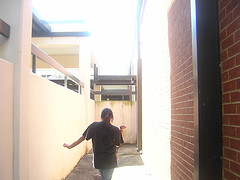Does suspending a student for truancy make sense?

As of July 1, 2009, in the state of Maryland, the answer is no. In the wake of high-profile school shootings since Columbine in 1999, zero-tolerance policies have increased suspensions significantly. And not just for bringing drugs or weapons on campus, but for missing school as well.
Some educators, however, see it as counterproductive to tell a student who is truant or chronically late that they’re suspended. To some students, this is a reward rather than a penalty. “It doesn’t make sense to suspend a child who is already out of school,” said Maryland senator Catherine E. Pugh. She sponsored the bill ending suspensions for truancy and tardiness.

Photo by Tanjila (Flickr)
Instead public schools will attempt to address the underlying causes of truancy, including problems at home, and absent and incarcerated parents. In-school suspensions or detention after school is still available as a consequence for chronic offenders.
The problem is not unique to one state or another. It’s widespread and even being addressed in other countries. In Australia, discussion is ongoing about the high truancy rate for indigenous (Aboriginal) children. An attempt is underway to have all children in school by January, 2010. An estimated 20,000 do not attend at any one time.
Compulsory school attendance in Australia may be tied to welfare benefits, thereby giving parents incentive to get their kids to school. It comes down to a matter of right (to an education) and responsibility (of parents to enforce).
There have been cases in the U.S. where parents have paid a stiff price for neglecting their children’s education. For more about this, see “Parents Prosecuted for Kid’s Truancy“.



per a group of three teen boys, they agree that suspension would be a reward-they feel students who are truant should receive in-school suspension, after school detention, or Saturday school